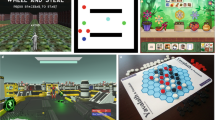Abstract
Researchers in the field of computer games interest in creating not only strong game-playing programs, but also programs that can entertain or teach human players. One of the branches is procedural content generation, aiming to generate game contents such as maps, stories, and puzzles automatically. In this paper, automatically generated puzzles are used to assist human players in improving the playing skills for the game of Tetris, a famous and popular tile-matching game. More specifically, a powerful technique called T-spin is hard for beginners to learn. To assist beginners in mastering the technique, automatically generated two-step to T-spin problems are given for them to solve. Experiments show that the overall ability for beginners to complete T-spin during play is improved after trained by the given problems. The result demonstrates the possibility of using automatically generated problems to assist human players in improving their playing skills.
Access this chapter
Tax calculation will be finalised at checkout
Purchases are for personal use only
Similar content being viewed by others
References
De Kegel, B., Haahr, M.: Procedural puzzle generation: a survey. IEEE Trans. Games 12(1), 21–40 (2020). https://doi.org/10.1109/TG.2019.2917792
Demediuk, S., Tamassia, M., Raffe, W.L., Zambetta, F., Li, X., Mueller, F.: Monte Carlo tree search based algorithms for dynamic difficulty adjustment. In: 2017 IEEE Conference on Computational Intelligence and Games (CIG 2017), pp. 53–59. IEEE (2017). https://doi.org/10.1109/CIG.2017.8080415
Hirose, M., Ito, T., Matsubara, H.: Automatic composition of Tsume-shogi by reverse method. J. Jpn. Soc. Artif. Int. 13(3), 452–460 (1998)
Hunicke, R., Chapman, V.: AI for dynamic difficulty adjustment in games. In: AAAI-04 Workshop on Challenges in Game Artificial Intelligence, pp. 91–96. AAAI Press (2004)
Ikeda, K., Shishido, T., Viennot, S.: Machine-learning of shape names for the game of Go. In: Plaat, A., van den Herik, J., Kosters, W. (eds.) ACG 2015. LNCS, vol. 9525, pp. 247–259. Springer, Cham (2015). https://doi.org/10.1007/978-3-319-27992-3_22
Ikeda, K., Viennot, S.: Production of various strategies and position control for Monte-Carlo Go - entertaining human players. In: 2013 IEEE Conference on Computational Intelligence in Games (CIG 2013), pp. 145–152. IEEE (2013). https://doi.org/10.1109/CIG.2013.6633625
Iqbal, A.: Increasing efficiency and quality in the automatic composition of three-move mate problems. In: Anacleto, J.C., Fels, S., Graham, N., Kapralos, B., Saif El-Nasr, M., Stanley, K. (eds.) ICEC 2011. LNCS, vol. 6972, pp. 186–197. Springer, Heidelberg (2011). https://doi.org/10.1007/978-3-642-24500-8_20
Kapturowski, S., Ostrovski, G., Quan, J., Munos, R., Dabney, W.: Recurrent experience replay in distributed reinforcement learning. In: The Seventh International Conference on Learning Representations (ICLR 2019) (2019)
Mantere, T., Koljonen, J.: Solving, rating and generating Sudoku puzzles with GA. In: 2007 IEEE Congress on Evolutionary Computation (CEC 2007), pp. 1382–1389. IEEE (2007). https://doi.org/10.1109/CEC.2007.4424632
Mnih, V., et al.: Human-level control through deep reinforcement learning. Nature 518(7540), 529–533 (2015). https://doi.org/10.1038/nature14236
Oikawa, T., Ikeda, K.: Procedural problem generation of Tetris for improving T-spin skill. In: The 23rd Game Programming Workshop (GPW-18), pp. 175–182 (2018)
Oranchak, D.: Evolutionary algorithm for generation of entertaining Shinro logic puzzles. In: Di Chio, C., et al. (eds.) EvoApplications 2010. LNCS, vol. 6024, pp. 181–190. Springer, Heidelberg (2010). https://doi.org/10.1007/978-3-642-12239-2_19
Ortiz-García, E.G., Salcedo-Sanz, S., Leiva-Murillo, J.M., Pèrez-Bellido, A.M., Portilla-Figueras, J.A.: Automated generation and visualization of picture-logic puzzles. Comput. Graph. 31(5), 750–760 (2007). https://doi.org/10.1016/j.cag.2007.08.006
Schlosser, M.: Computers and chess problem composition. ICCA Journal 11(4), 151–155 (1988). https://doi.org/10.3233/ICG-1988-11404
Sephton, N., Cowling, P.I., Slaven, N.H.: An experimental study of action selection mechanisms to create an entertaining opponent. In: 2015 IEEE Conference on Computational Intelligence and Games (CIG 2015), pp. 122–129. IEEE (2015). https://doi.org/10.1109/CIG.2015.7317939
Shaker, N., Togelius, J., Nelson, M.J.: Procedural Content Generation in Games: A Textbook and an Overview of Current Research. Springer (2016)
Silver, D., et al.: A general reinforcement learning algorithm that masters chess, shogi, and Go through self-play. Science 352(6419), 1140–1144 (2018). https://doi.org/10.1126/science.aar6404
Takahashi, R.: Mating problem generation of Puyo-Puyo for training. Master thesis, Japan Advanced Institute of Science and Technology, Nomi, Ishikawa, Japan (2018)
Wu, I.C., Wu, T.R., Liu, A.J., Guei, H., Wei, T.h.: On strength adjustment for MCTS-based programs. In: The 33rd AAAI Conference on Artificial Intelligence (AAAI-19). AAAI Press (2019)
Acknowledgments
This research is financially supported by Japan Society for the Promotion of Science (JSPS) under contract numbers 18H03347 and 17K00506.
Author information
Authors and Affiliations
Corresponding author
Editor information
Editors and Affiliations
Rights and permissions
Copyright information
© 2020 Springer Nature Switzerland AG
About this paper
Cite this paper
Oikawa, T., Hsueh, CH., Ikeda, K. (2020). Improving Human Players’ T-Spin Skills in Tetris with Procedural Problem Generation. In: Cazenave, T., van den Herik, J., Saffidine, A., Wu, IC. (eds) Advances in Computer Games. ACG 2019. Lecture Notes in Computer Science(), vol 12516. Springer, Cham. https://doi.org/10.1007/978-3-030-65883-0_4
Download citation
DOI: https://doi.org/10.1007/978-3-030-65883-0_4
Published:
Publisher Name: Springer, Cham
Print ISBN: 978-3-030-65882-3
Online ISBN: 978-3-030-65883-0
eBook Packages: Computer ScienceComputer Science (R0)





